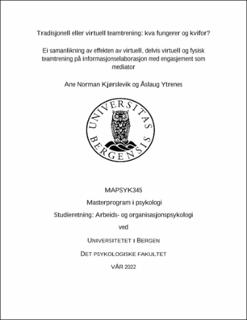| dc.contributor.author | Kjørslevik, Ane Norman | |
| dc.contributor.author | Ytrenes, Åslaug | |
| dc.date.accessioned | 2022-06-20T08:57:29Z | |
| dc.date.issued | 2022-04-20 | |
| dc.date.submitted | 2022-06-14T22:00:01Z | |
| dc.identifier.uri | https://hdl.handle.net/11250/2999490 | |
| dc.description.abstract | Rask teknologisk utvikling fører til stadig nye former for virtuell teamtrening. Covid-19 pandemien gjorde i tillegg at ein var tvungen til å raskt finne gode alternativ til meir tradisjonell andlet-til-andlet trening. Samstundes manglar det forsking som samanliknar ulike treningsmodalitetar. Denne studien ønskjer å svare på etterspørselen om meir kunnskap. Effektiviteten av ulike treningsmodalitetar vart undersøkt ved å sjå på treningsdeltakarane si utvikling av teamferdigheiter i form av informasjonselaborasjon. Vidare er det undersøkt om engasjement hos treningsdeltakarane medierer denne samanhengen. Data er henta frå 799 norske studentar med ulike helsefaglege utdanningsbakgrunnar som deltok i teamtrening ved Senter for tverrprofesjonell samarbeidslæring (TVEPS). Studentane svarte på spørjeskjema med eit pre-test post-test design og ei evaluering for opplegget etter å ha fullført teamtreninga. TVEPS la i 2020 om treninga til delvis virtuell og virtuell form som gjer at deltakarane fordeler seg i tre samanliknbare grupper, fysisk trening, delvis virtuell trening og virtuell trening. Ei samanlikning av pre-test og post-test skårar viser at teamtreninga uavhengig av treningsmodalitet gir auka informasjonselaborasjon. Resultat frå Multikategorisk medieringsanalyse indikerer at virtuell trening samanlikna med fysisk trening er negativt assosiert med informasjonselaborasjon. Analyseresultatet viser at engasjement delvis medierer denne samanhengen. Ingen signifikant forskjell blei funne mellom treningsdeltakarar som hadde delvis virtuell og virtuell trening. Denne studien bidrar med kunnskap om ulike treningsmodalitetar og engasjement i trening. Den antydar at virtuell teamtrening har dårlegare effekt enn tradisjonell andlet-til-andlet trening og at lågare grad av engasjement hos deltakarane spelar ei rolle her. | |
| dc.description.abstract | Rapid advances in technology have led to novel approaches in virtual team training. The Covid-19 pandemic have additionally made it necessary to quickly find good alternatives to traditional face-to-face training. However, studies comparing different training modalities are lacking. This study seeks to rectify this. The efficacy of different training modalities was investigated by looking at trainees’ information elaboration abilities. Further, it has been assessed whether trainee’s engagement mediates this relationship. Data was gathered from 799 Norwegian students with different educational backgrounds in health participating in a team training program by the Centre for Interdisciplinary Work-Place Learning (TVEPS). The students answered a questionnaire with a pre-test post-test design and an evaluation of the program at the end of the training intervention. In 2020 TVEPS changed the delivery method to partly virtual and virtual, which divides trainees into three distinct training groups, physical, partly virtual, and virtual. A comparison of the pre-test and post-test scores including all groups show that team training is associated with increased information elaboration. Multicategorical mediation analysis results indicate that virtual training compared with physical training is negatively associated with information elaboration. Results show that engagement partially mediates this relationship. No significant difference was found between trainees participating in partly virtual and virtual training. This study contributes with knowledge on the effects of training modality and engagement which has been insufficiently researched. Virtual team training is indicated to be less effective than traditional face-to-face training, which is partially explained by lower levels of engagement. | |
| dc.language.iso | nno | |
| dc.publisher | The University of Bergen | |
| dc.rights | Copyright the Author. All rights reserved | |
| dc.subject | virtuell teamtrening | |
| dc.subject | teamtrening | |
| dc.subject | Team | |
| dc.subject | team | |
| dc.subject | informasjonselaborasjon | |
| dc.subject | engasjement | |
| dc.subject | Teamtrening | |
| dc.title | Tradisjonell eller virtuell teamtrening: kva fungerer og kvifor? Ei samanlikning av effekten av virtuell, delvis virtuell og fysisk teamtrening på informasjonselaborasjon med engasjement som mediator | |
| dc.title.alternative | Traditional or Virtual Team Training: What works and why? A comparison of the Effect of Virtual, Partly Virtual and Physical Team Training on Information Elaboration with Engagement as Mediator | |
| dc.type | Master thesis | |
| dc.date.updated | 2022-06-14T22:00:01Z | |
| dc.rights.holder | Copyright the Author. All rights reserved | |
| dc.description.degree | Masteroppgåve i arbeids- og organisasjonspsykologi | |
| dc.description.localcode | MAPSYK345 | |
| dc.description.localcode | MAPS-AOP | |
| dc.description.localcode | MAPS-PSYK | |
| dc.subject.nus | 736999 | |
| fs.subjectcode | MAPSYK345 | |
| fs.unitcode | 17-35-0 | |
| dc.date.embargoenddate | 2023-04-20 | |
